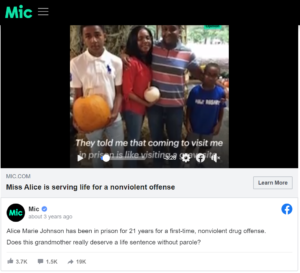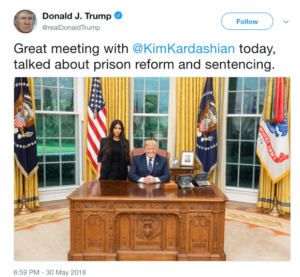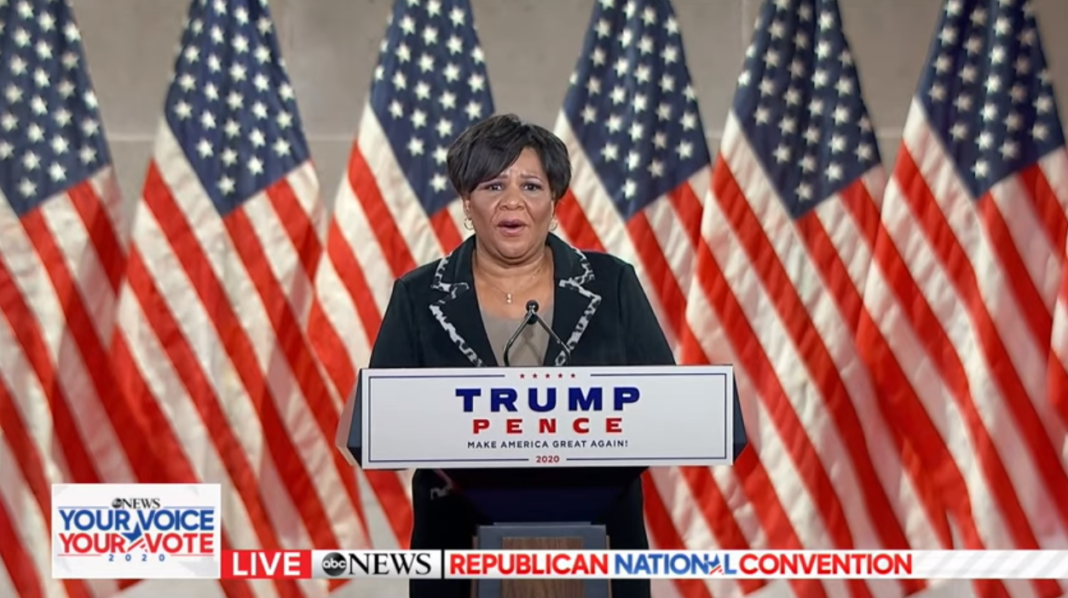WASHINGTON DC—Alice Johnson, a 63-year old Tennessee woman, sentenced to life in prison for non-violent illegal drug charges and her role in a cocaine distribution ring in 1996, received a full pardon at the White House on Tuesday, August 28, 2020. At the Republican National Convention on August 27, 2020, just one day earlier, she publicly praised Trump for giving her a “second chance at life.”

Kevin (Lamarque/Reuters)
In an expression of gratitude, Johnson said: “I am free to hug my family. I am free to start over. This is the greatest day of my life. My heart is bursting with gratitude. I want to thank President Donald John Trump. I am an example of a woman who has been given a second chance in life. God bless you.”
Johnson said she turned to cocaine trafficking after a series of tragedies. She had a divorce, lost her son in a motorcycle accident, and lost her job at FedEx according to an interview in a video published in 2017 by Mic, an online news outlet. The video had 19K shares as of August 29, 2020.

At the Oval Office on Tuesday, at around 2:10 p.m. EST, Trump made remarks about his disapproval of her sentencing: “And you spent about 22 years? And — for something that, today, a lot of people wouldn’t even be going to jail for. And it was — it was horrible.”
In 2018, celebrity and aspiring lawyer Kim Kardashian West brought the issue of Johnson’s case to President Trump. She sat down with Trump in the Oval Office alongside her attorney Shawn Chapman Holley, to ask him to grant clemency for Johnson, who has been imprisoned for over 21 years in Aliceville, Alabama. She was granted clemency and released on June 6, 2018.
Trump himself tweeted a photograph following the meeting, saying the two discussed “prison reform and sentencing.”

Photo: Donald Trump’s Tweet
A White House statement commended the “model prisoner” for her commitment to rehabilitating herself and recognizing her crimes.
“Ms. Johnson has accepted responsibility for her past behavior and has been a model prisoner over the past two decades. Despite receiving a life sentence, Alice worked hard to rehabilitate herself in prison, and act as a mentor to her fellow inmates,” the statement read.
“Since [Johnson’s] arrival at this institution, she has exhibited outstanding and exemplary work ethic. She is considered to be a model inmate who is willing to go above and beyond in all work tasks,” the warden said.
“While this Administration will always be very tough on crime, it believes that those who have paid their debt to society and worked hard to better themselves while in prison deserve a second chance,” the statement concluded.
Alice Johnson said at the Republican National Convention 2020 that when she was arrested for cocaine trafficking as a first-time offender. “What I did was wrong. I made decisions I regret.”
Describing how she used her 22 years in prison to serve others on the podium, she described her experiences as a playwright, a mentor, and a “certified hospice volunteer”. She received the “special Olympics coordinator of the year award” for disabled women.
Voicing her support for others she is considered to be serving unjust prison sentences, she said: “My transformation was described as extraordinary.” Wishing to share news of the strong influence her religion had on her rehabilitation, she said: “My Christian faith and the prayers of so many kept hope alive.”
Johnson described President Trump’s intervention on her behalf: “When Trump heard about me and the injustice of my story, he acted and had compassion, and he acted. Free in body thanks to President Trump but free in mind thanks to the Almighty God. I was released on June 6, 2018, I ran across that road and hugged my grandchildren for the first time.”
Described as an “American criminal justice system reform advocate,” Johnson vowed to continue to fight for those who were imprisoned for life under similar circumstances.
Along with Johnson, over 1,907 federal inmates were serving life sentences for non-violent drug offenses as of 2016, according to federal corrections data analyzed by criminal justice group “The Sentencing Project.”
“There are thousands just like me who deserve the opportunity to come home,” Alice Johnson said. “I remembered the promise I made for the men and women I left behind. I will use my voice to tell their stories.”
In December 2018, President Trump signed the First Step Act into law, aimed at reducing harsh penalties for drug felonies. The bill revises the Controlled Substances Act’s drug penalties, including a lowering of the “three strikes” rule for drug felons that resulted in life sentences, now down to 25 years, and it changes the two or more felonies within the rule from any “felony drug offense” to “a serious drug felony or serious violent felony,” defined in the text of the bill.
“The First Step Act will help prepare inmates to successfully rejoin society and enact commonsense sentencing reforms to make our justice system fairer for all Americans,” said a White House statement.
At Alice Johnson’s RNC speech, the grandmother made a reference to the First Step Act: “It was real justice reform, and it brought joy, hope and freedom to thousands of well-deserving people.” Expressing her hope for advocacy in justice reform she said, “My hope in justice and mercy was rewarded.”
Seeing her advocacy as part of God’s “purpose and plan” Johnson felt she was “destined for such a time as this.” Johnson concluded by telling her audience that she hoped they would be inspired by her story, moved to compassion, and take action for those who are “forgotten.”







